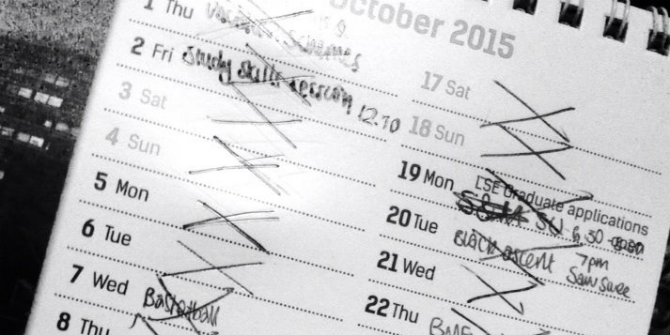Before coming to the LSE, I didn’t think much about leaving Denmark to study abroad. However, I have realized now that I brought more of my Danishness with me than I had anticipated. I suddenly find myself hungering after the kind of group-ethos of the Danish education system in which individual feats are appreciated, but group achievements are accentuated. At LSE however, and probably most universities around the world, focus is very much on the individual and what the individual can achieve. However, I firmly believe that it is only in relations with others that we truly move and change ourselves and our societies. And I didn’t know that I believed this until I came here. So there – I learned something new.
I am sure that I can’t be the only one slightly tired of sitting alone, staring into my computer or my book. There are many other, more fun ways of learning! So here are some tips about how to bring some Scandinavian group-ethos into your LSE education system. Yes, you can wear some Norwegian wool sweaters, eat some Danish rye bread or Swedish meatballs while you do it. But no watching Borgen. Then you won’t get any work done.
1. Form a study group

This can be any kind of study group. Perhaps you just meet up and discuss whatever you’ve read very loosely, or you agree in advance which texts to read and summarize them for each other. This can be a really good strategy if you have a course with a lot of reading and little time (read: all LSE courses). Study groups are a great place to voice those thoughts and perspectives you might have thought about while reading, but which don’t fit into any of your papers or formal classroom discussions.
2. Go to the pub
Not to advocate the use of alcohol, but Danes nearly never get together without there being beer involved. Beer gets the cold Danish blood moving and conversation flowing. Any true philosophical or academic discussion happens in a bar. If you have a class that ends in the afternoon, this is an ideal time to get people together for a pint at any of the nearby LSE pubs. This is where you get to expand upon some of those much more general, connecting thoughts you’ve been thinking which explain all of mankind and inspire you to think further. If you don’t enjoy drinking, find some Norwegian or Swedish people to ask for advice. Their alcohol policies are much stricter.
3. Create something together
Get some people together to create something about what you’re learning. For example, in one of my study groups, we’ve created a blog to document all the random and weird historical facts we come across in our reading. It’s an outlet for our academic creativity. You could also arrange a pub quiz for your program together with a group of your fellow students and test everyone’s nerdy knowledge! It’s a wonderful feeling of achievement when you’ve actually produced something collectively.
If any of these sound appealing to you, here are some very important things to keep in mind when trying to create that truly Scandinavian group setting:
You are not always right. In fact, you are rarely right. Other people have opinions too, and they count just as much as yours. There’s nothing more interesting then getting into a discussion with someone who doesn’t agree with you and ending up realizing that their way might, in this context, be more useful than yours.
Be aware of group dynamics. It’s important to give space to everyone in the group, even if some people talk less than others. Make the group a safe space where everyone feels comfortable expressing their opinion. Also realize that different people usually function differently in groups. Figure out which roles you would like to take.
An achievement isn’t as much fun if it’s not shared. Give each other a pat on the back for every good mark you get, and a nice hug or some chocolate for any less-than-expected marks as well. These will keep your mood up during exam time as well.
Remember: your individual achievements are important, but it’s so much more fun to share them! Happy grouping!





